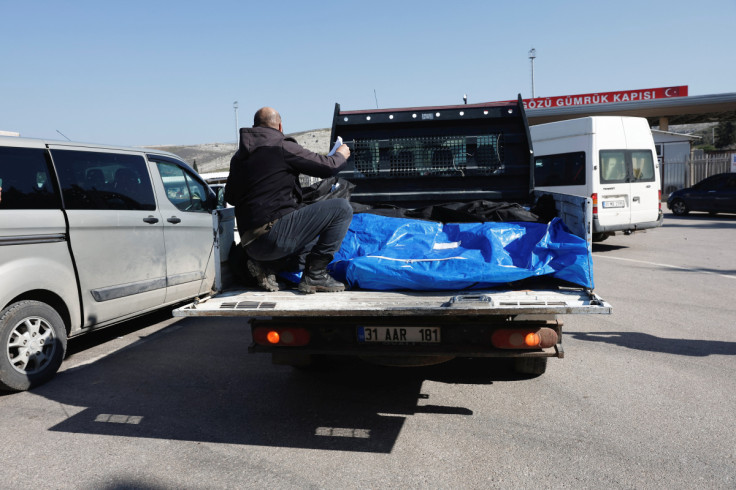In Black Body Bags, Syrians In Turkey Make Final Journey Home

They arrived at the border in taxis, run-down vans and in piles atop flatbed trucks: black body bags carrying Syrian refugees killed by the earthquake in Turkey, now being taken to final resting places in their war-ravaged homeland.
Relatives clutched paperwork issued by local authorities that would let the dead - but not their living relatives - pass into Aleppo province through Turkey's Cilvegozu border-crossing, closed to regular traffic since Syria's conflict began 12 years ago.
Across the border, family members will pick them up for burials.
Hussein Ghandoura crouched inside a truck and put his cheek to one of five black bags. Inside, the body of his 16-year-old son Mohammad.
"I just said goodbye to him before his final journey," Ghandoura told Reuters on Wednesday.
More than 8,500 people died in Turkey as a result of record-breaking earthquakes that struck on Monday. Among the casualties are Syrians who since 2011 have fled the conflict raging in their home country. The tremors killed 2,500 more in Syria.
The border between the two neighbours remains closed to most traffic and, so far, to aid operations. But Turkish authorities were allowing bodies certified by Turkish hospitals to cross into northern Syria, much of which is held by rebel forces opposed to the Damascus government.
A man held back two crying women as they tried to stay near one of the trucks full of bodies.
"Let the dead go first, then maybe one day the living can go," he told them.
Ossama Abdulrazzaq, a tall Syrian, eyes bleary with tears, checked the paperwork for his sister's body.
"She's pregnant in her final month. She was supposed to give birth in two days. She's supposed to go into labour," Abdulrazzaq said.
FAMILY TRAGEDY
Many extended Syrian families live in the hard-hit city of Antakya and in Kirikhan, a small Turkish town about 50 km (30 miles) from the border.
In Kirikhan, Turkish rescue teams with cranes were pulling back rubble from homes on Wednesday, aided by Syrians in work gloves looking for their own relatives.
One body after the other, Salah al-Naasan, 55, found his family.
Carrying crumpled family photographs, the Syrian man wept on the sidewalk as rescuers brought his daughter-in-law, also pregnant, then his two grandchildren. His son was still missing.
Naasan, screaming with grief, begged rescuers to check if the unborn child had survived. Few medics were visible.
A rescuer pulled back the blankets covering one of the toddlers, revealing a lifeless hand with a purple bruise and a pale face covered in dirt.
Zaher Kharbotly, a stocky 43-year-old man from the Syrian province of Idlib, somehow still had hope.
He stood in front of the apartment where his two sisters and their children lived on the ground floor. Over and over, he counted the floors that had pancaked atop one another.
"We fled to Turkey under the bombs to protect our children. Now look at us. We're just fleeing from death to death," he said.
Kharbotly said that if his worst fears were confirmed, he also would bury the family in Syria.
"Our land kicked us out - but when we perish, it will accept us."
© Copyright Thomson Reuters 2024. All rights reserved.





















